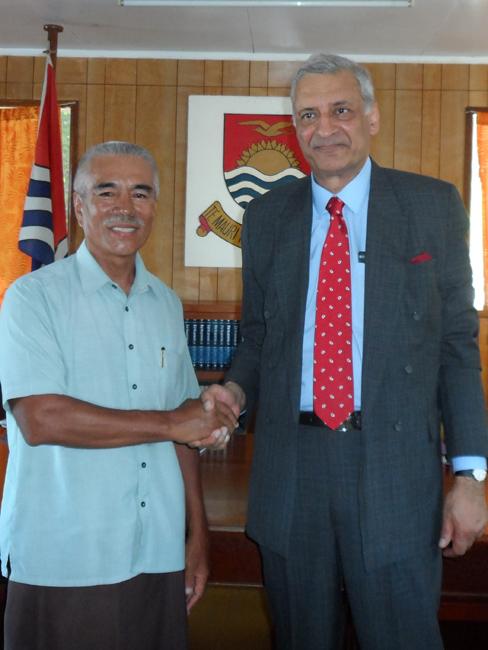
An island in Kiribati
By Kamalesh Sharma, Commonwealth Secretary-General
To the visitor, countries like Kiribati and Nauru in the Pacific look like picture postcard islands in the sun fringed by coconut trees and pandanus palms. But the reality is far from the photoshopped images of a tropical paradise.
The climate change-induced rising tide is a looming existential threat to Kiribati and other low-lying small island states of the Pacific region. As the sea claims the shores of these islands and encroaches on coastal lands, the islanders have to move further inland. But where a country’s land boundaries, from one shore to the other, are a short 100 metres or less, there is little place left to go. As the sea sweeps across the low-lying atolls, the inhabitable area shrinks while population density increases, causing overcrowding. This is the dilemma for Kiribati. Climate change is a clear and present danger – it has arrived. There is an evident distinction between the climate change ‘vulnerable’ and the ‘already affected’.
President Anote Tong has predicted that in less than 50 years, Kiribati may be no more. It will only be known by those who survive its demise, swallowed by the ocean. Like a page in an old geography book, Kiribati could become a case study as a national climate change casualty – the loss of a country and the destruction of a culture. The loss of a homeland and one’s national and cultural identity would be a tragedy. A generation of climate change refugees seeking shelter and safety in foreign lands is a future that may await the citizens of vulnerable Pacific islands. The forced migration of peoples from the land of their birth and the land of their forebears is a sad prospect.
Leaving home is not the favoured option. But in the event that migration should take place, the environmental refugees should not pose a burden to recipient countries and be a drain on social welfare. Skills upgrading and re-training of workers will enable them to find jobs in their adopted countries as they carve out a new life and livelihood with their skills, creating a boon through their resettlement within the Pacific community.
But in relocating to foreign shores, how can you show your children and grandchildren their heritage - the customs, traditions, beliefs and rituals of island life? The languages of the islands will languish when oral traditions are lost as the language and culture of adopted lands is embraced. The loss of one’s cultural identity through integration and assimilation in new homelands is the price of building a new national identity. This is the outlook for the future through global warming.
Small states, including Pacific island states, account for around one quarter of the world’s countries. Some are land-locked while most are sea-locked islands, vulnerable but also remarkably resilient to isolation, size and historical climate patterns. They account for little of the carbon footprint, but bear a disproportionate amount of the impact of greenhouse gas emissions brought about by industrialisation and globalisation.
Climate change financing can unlock opportunities for small island states to help stem the tide of destruction through adaptation and mitigation. The problem is not the availability of finance but the ability of small states to access that finance. There are about 20 leading global funds, each with its own criteria to meet and technical data to be provided. Most small states simply do not have the capacity to fill in the forms. How does a country with a foreign ministry of eight staff cope with the demands of a climate change fund staffed by 80 or 800?
In 2009, the Copenhagen Summit on climate change produced disappointing results in many respects. The stand-out success was agreement to a Fast Start Fund of US$10 billion – a Commonwealth initiative for small and vulnerable states affected by climate change. The funds are available and should be released as a priority for those countries already affected by climate change before it is too late.
There is a way to ease the burden and to unlock the funds. The solution is a climate change master key to open the war chests of all the available funds. This should take the form of an accreditation procedure: if a small state can demonstrate its vulnerability and need to a commonly agreed standard, then that should be adequate to achieve access to any of the sources of finance.
In the meantime, planting mangroves and building sea walls to reduce coastal erosion and salination of water supplies and arable land are some of the short-term solutions being planned and implemented by small island states. But more sustainable solutions, including climate change financing mechanisms, are required to stem the rising tide.
(The Commonwealth Secretary-General Kamalesh Sharma, visited Kiribati from 6-8 November and Nauru from 29-31 October 2012, to hold talks with leaders of both Pacific island states, and to learn more about their concerns about the impact of climate change.)




